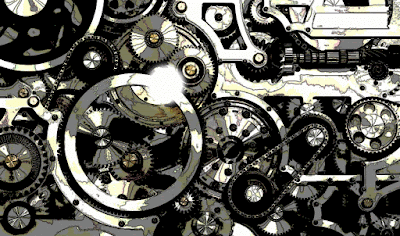The Lincolnshire Regiment was the county Army Regiment of my home County, Lincolnshire, in England. It has now been amalgamated out of existence. Of passing interest is the fact that Lincolnshire natives, like me, have, or used to have, the nickname of 'Yeller Bellies' (Yellow Bellies) possibly, just possibly, due to the facing colours of the Regiments uniform in the 18th Century.
The colour in the background is Lincoln Green - the colour of Lincolnshire. This colour is also closely associated with Robin Hood.
"The Royal Lincolnshire Regiment was a line infantry regiment of the British Army raised on 20 June 1685 as the Earl of Bath's Regiment for its first Colonel, John Granville, 1st Earl of Bath. In 1751, it was numbered like most other Army regiments and named the 10th (North Lincoln) Regiment of Foot. After the Childers Reforms of 1881, it became the Lincolnshire Regiment after the county where it had been recruiting since 1781. After the Second World War, the regiment was honoured with the name Royal Lincolnshire Regiment, before being amalgamated in 1960 with the Northamptonshire Regiment to form the 2nd East Anglian Regiment (Duchess of Gloucester's Own Royal Lincolnshire and Northamptonshire) which was later amalgamated with the 1st East Anglian Regiment (Royal Norfolk and Suffolk), 3rd East Anglian Regiment (16th/44th Foot) and the Royal Leicestershire Regiment to form the Royal Anglian Regiment. 'A' Company of the 2nd Battalion of the Royal Anglians continues the traditions of the Royal Lincolnshire Regiment.
Battle Honours of the Lincolnshire Regiment:
Steenkirk 8 July 1692, War of the Spanish Succession 1702–1713, Blenheim 13 August 1704, Ramillies 23 May 1706, Oudenarde 11 July 1708, Malplaquet 11 September 1709, Bouchain 13 September 1711, Peninsula 1816, Sobraon 10 February 1846, Mooltan 21 December 1848, Goojuarat 21 February 1849, Punjab 1857, Lucknow 1858 1863, Atbara 1898, Khartoum 1898, Boer War 1899–1902, Pardeberg 19 February 1899, South Africa 1900–02,
Great War:
Mons, Le Cateau, Retreat from Mons, Marne 1914, Aisne 1914, '18, La Bassée 1914, Messines 1914, 1917, 1918, Armentières 1914, Ypres 1914, '15, '17, Nonne Bosschen, Neuve Chapelle, Gravenstafel, St. Julien, Frezenberg, Bellewaarde, Aubers, Loos, Somme 1916, '18, Albert 1916, '18,Bazentin, Delville Wood, Pozières, Flers-Courcelette, Morval, Thiepval, Ancre 1916, '18, Arras 1917, '18,Scarpe 1917, '18, Arleux, Pilckem, Langemarck 1917, Menin Road, Polygon Wood, Broodseinde, Poelcappelle, Passchendaele, Cambrai 1917, '18, St. Quentin, Bapaume 1918, Lys, Estaires, Bailleul, Kemmel, Amiens, Drocourt Quéant, Hindenburg Line, Épéhy, Canal du Nord, St. Quentin Canal, Beaurevoir, Selle, Sambre, France and Flanders 1914–18, Suvla, Landing at Suvla, Scimitar Hill, Gallipoli 1915, Egypt 1916
Second World War:
Vist, Norway 1940, Dunkirk 1940, Normandy Landing, Cambes, Fontenay le Pesnil, Defence of Rauray, Caen, Orne, Bourguébus Ridge, Troarn, Nederrijn, Le Havre, Antwerp-Turnhout Canal, Venraij, Venlo Pocket, Rhineland, Hochwald, Lingen, Bremen, Arnhem 1945, North-West Europe 1940, '44–45, Sedjenane I, Mine de Sedjenane, Argoub Selah, North Africa 1943, Salerno, Vietri Pass, Capture of Naples, Cava di Terreni, Volturno Crossing, Garigliano Crossing, Monte Tuga, Gothic Line, Monte Gridolfo, Gemmano Ridge, Lamone Crossing, San Marino, Italy 1943–45, Donbaik, Point 201 (Arakan), North Arakan, Buthidaung, Ngakyedauk Pass, Ramree, Burma 1943–45"
Note: It didn't serve in North America during the slight trouble we had with the Colonists there in the 18th Century.
(Information from Wikipedia)
The march of the Regiment was The Lincolnshire Poacher:
When I was bound apprentice in famous Lincolnshire
Full well I served my master for more than seven year
Till I took up with poaching, as you will quickly hear
Oh! 'tis my delight on a shiny night, in the season of the year
As me and my comrades were setting of a snare
'Twas then we seed the gamekeeper - for him we did not care
For we can wrestle and fight, my boys and jump o'er anywhere
Oh! 'tis my delight on a shiny night in the season of the year
As me and my companions were setting four or five
And taking up on him again, we caught the hare alive
We caught the hare alive, my boys, and through the woods did steer
Oh! 'tis my delight on a shiny night in the season of the year
I threw him on my shoulder and then we trudged home
We took him to a neighbour's house, and sold him for a crown
We sold him for a crown, my boys, but I did not tell you where
Oh! 'tis my delight on a shiny night in the season of the year
Bad luck to every magistrate that lives in Lincolnshire
Success to every poacher that wants to sell a hare
Bad luck to every gamekeeper that will not sell his deer
Oh! 'tis my delight on a shiny night in the season of the year
https://www.youtube.com/watch?v=MJdRxUPTKvU
The official flag of Lincolnshire is:
It has only existed since 2005 however. The red cross is the Saint George's Cross representing England. Yellow represents the crops grown in the county, as well as the nickname "Yellowbellies" given to people born and bred in Lincolnshire. Blue represents both the sea of the East coast and the wide skies of Lincolnshire, and green symbolises the rich lushness of fenland fields. The fleur de lys is a recognised symbol of the City of Lincoln.
The flower of Lincolnshire is the common dog-violet:
Just for information and interest.





























